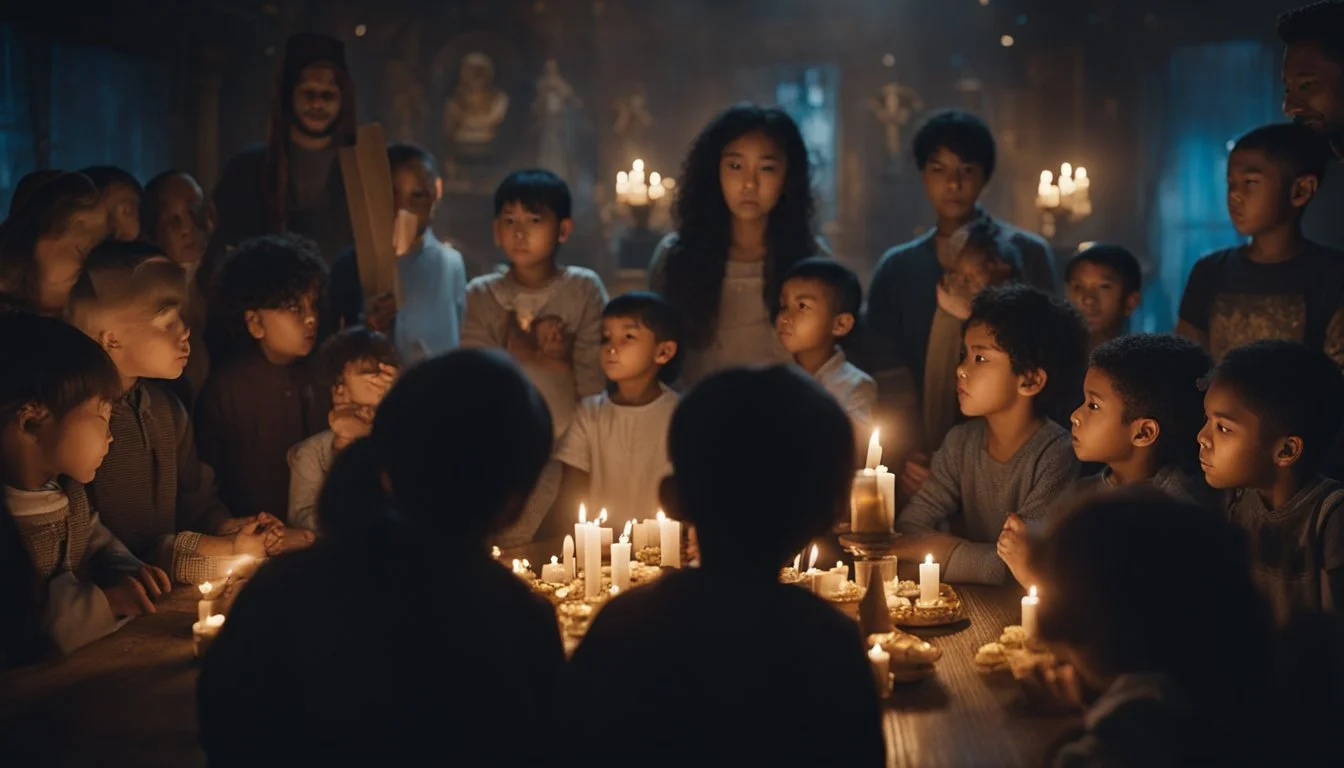Documentary Jesus Camp Unintentionally Leads to Closure of Evangelical Summer Programs
"Jesus Camp" exposed the intense world of evangelical Christian youth camps, sparking widespread controversy upon its 2006 release. The documentary followed children attending Becky Fischer's "Kids on Fire" summer camp, where they engaged in fervent worship and political activism.
The film's raw portrayal of young children being immersed in conservative evangelical culture led to unexpected consequences for those involved. While it aimed to shed light on a specific religious subculture, "Jesus Camp" ultimately resulted in the closure of the very camp it documented.
The unflinching depiction of children speaking in tongues, praying over cardboard cutouts of political figures, and being groomed for spiritual warfare resonated deeply with viewers across the ideological spectrum. This exposure brought intense scrutiny to Fischer's methods and the broader implications of instilling such beliefs in impressionable young minds. The resulting backlash and safety concerns eventually forced the closure of "Kids on Fire," demonstrating the power of documentary filmmaking to impact real-world events.
Background of 'Jesus Camp'
'Jesus Camp' gained widespread attention as a controversial documentary film exploring the world of evangelical Christian youth camps. It shed light on the intense religious indoctrination of children and the blending of faith with conservative political ideologies.
The Origin and Mission
'Jesus Camp' focused on the Kids on Fire School of Ministry, a summer camp in Devils Lake, North Dakota. Founded by Pentecostal minister Becky Fischer, the camp aimed to create a new generation of devoted Christian leaders. Fischer believed in training children to be spiritual warriors for God and conservative causes.
The camp's mission centered on instilling unwavering faith and evangelical values in young attendees. Activities included intense prayer sessions, speaking in tongues, and political activism. Children were encouraged to take on adult-like spiritual responsibilities from a young age.
Key Figures and Personalities
Becky Fischer emerged as the central figure in 'Jesus Camp'. As the camp's founder and director, she championed the idea of shaping children into passionate Christian activists. Her charismatic and assertive teaching style left a lasting impression on viewers.
Other notable personalities included:
Levi, a charismatic young boy aspiring to be a preacher
Rachael, a girl passionate about converting others to Christianity
Tory, a child who struggled with reconciling her faith and secular interests
These children became the faces of the documentary, offering insights into the camp's impact on young minds.
Kids on Fire School of Ministry
The Kids on Fire camp operated as an intensive spiritual training ground for children aged 6 to 12. Daily activities focused on prayer, worship, and lectures on Christian doctrine and conservative values. The camp environment was designed to be immersive and emotionally charged.
Key aspects of the camp included:
Speaking in tongues and faith healing practices
Lessons on creationism and climate change skepticism
Training in evangelism and public speaking
The documentary highlighted how the camp blended religious teachings with political messages, particularly emphasizing issues like abortion and American patriotism.
Theological Foundations
Evangelical Christianity rests on specific doctrinal beliefs and scriptural interpretations. These form the basis for practices like those depicted in "Jesus Camp" and shape the worldview of adherents.
Evangelical Beliefs and Practices
Evangelicals emphasize personal salvation through faith in Jesus Christ. They believe in the Bible as the inspired, inerrant word of God. Sin is viewed as separation from God that requires redemption. Evangelicals practice regular Bible study, prayer, and evangelism.
Preachers play a central role in Evangelical communities. They deliver sermons to instruct believers and inspire faith. Many Evangelicals believe in prophetic gifts and divine healing. Worship services often include passionate prayer and expressions of devotion.
Evangelical children are taught these beliefs from a young age. Bible memorization, Christian education, and youth programs reinforce doctrinal foundations. Some critics argue this limits critical thinking about faith.
The Scripture and Its Interpretation
Evangelicals take a literal approach to Biblical interpretation. They view Scripture as God's direct revelation to humanity. The Bible is seen as the ultimate authority on moral and spiritual matters.
Key doctrines include:
The divinity of Jesus
Salvation by grace through faith
The Trinity
Biblical inerrancy
Evangelicals emphasize personal Bible study. They believe the Holy Spirit guides interpretation. Critics argue this can lead to selective readings that confirm existing beliefs.
Many Evangelicals reject historical-critical methods of Biblical scholarship. They see these as undermining Scriptural authority. This can create tension with academic theological approaches.
Camp Structure and Daily Life
Jesus Camp featured an intense, immersive religious environment designed to shape young minds. The camp's structure and routines prioritized spiritual formation and evangelical teachings above typical summer camp activities.
Activities and Education
The camp's daily schedule revolved around religious instruction and worship. Mornings began with prayer sessions and Bible study. Children participated in sermons, often delivered by adult leaders or guest speakers.
Praise and worship music played a central role, with campers engaging in passionate singing and dancing. Some activities mimicked secular summer camps, like outdoor games, but with religious themes incorporated.
Art projects and skits focused on Biblical stories or evangelical messages. Evening gatherings featured emotional altar calls and speaking in tongues.
Formation and Indoctrination
The camp aimed to mold children into committed evangelical Christians. Leaders emphasized personal relationships with Jesus and the importance of spreading the faith.
Teachings stressed conservative Christian interpretations of the Bible. Campers learned to view secular culture as a threat to their faith. Political topics like abortion and creationism were presented from an evangelical perspective.
Children were encouraged to become "Christian soldiers" in a spiritual battle. Some activities involved military-style training exercises with religious overtones.
Home-Schooled and Summer Camp Experience
Many campers came from home-schooled backgrounds, aligning with the camp's conservative Christian worldview. The camp provided an intensive, community-based extension of their home education.
Unlike typical summer camps, Jesus Camp offered limited recreational activities. The focus remained on spiritual growth and indoctrination throughout each day.
For some children, the camp represented their main opportunity for peer interaction outside their families. This amplified the impact of the camp's teachings and social dynamics on impressionable young minds.
Impact on the Attendees
The Jesus Camp experience profoundly affected its young participants, shaping their personal development and religious beliefs. It raised questions about the intersection of childhood and intense religious indoctrination.
Personal Development and Faith Formation
Children at Jesus Camp underwent intense spiritual training aimed at deepening their evangelical Christian faith. Participants like Rachael Elhardt, Levi, and Tory engaged in passionate worship, prayer, and evangelism activities. These experiences often led to heightened religious fervor and a sense of spiritual empowerment.
The camp's emphasis on conservative values and political activism also influenced attendees' worldviews. Many children adopted strong positions on social issues aligned with the camp's teachings.
Some former attendees later reported mixed feelings about their experiences. While some maintained their faith, others struggled with doubt or left evangelicalism entirely as adults.
The Intersection of Childhood and Religion
Jesus Camp's approach to children's religious education sparked debate about age-appropriate spiritual instruction. Critics argued the camp's intense methods could be psychologically overwhelming for young minds.
The blurring of boundaries between childhood innocence and adult religious zeal was evident in many camp activities. Children as young as 6 or 7 engaged in practices like speaking in tongues and faith healing.
Relationships between campers often centered on shared religious experiences rather than typical childhood friendships. This dynamic raised questions about social development and the balance between spiritual and secular aspects of growing up.
Societal and Cultural Reactions
"Jesus Camp" sparked intense debates about religious education and children's rights. The film's portrayal of evangelical Christian youth camps elicited strong responses across American society.
Media Analysis and Public Perception
The documentary received significant media attention upon release. Major news outlets and film critics analyzed its content, often expressing concern over the intensity of religious indoctrination depicted. Many viewers were shocked by scenes showing children speaking in tongues and engaging in political activism.
Public perception was divided. Some praised the film for exposing what they saw as extreme practices, while others defended the camps as expressions of religious freedom. Social media platforms buzzed with discussions about the ethics of childhood religious education.
The film's directors, Rachel Grady and Heidi Ewing, found themselves thrust into the spotlight. They gave numerous interviews explaining their approach and intentions in making the documentary.
Criticism and Controversy
"Jesus Camp" faced sharp criticism from various quarters. Religious leaders accused the filmmakers of bias and selective editing to portray the camps negatively. Some evangelical Christians felt misrepresented and argued the film focused on fringe elements within their community.
Child welfare advocates raised concerns about potential psychological harm to young participants. They questioned whether such intense religious experiences constituted a form of child abuse or exploitation.
The controversy extended to political spheres. Some politicians and pundits used the film to argue for stricter oversight of religious education programs. Others defended the camps as protected under religious freedom laws.
Debates raged about the line between education and indoctrination. The film prompted wider discussions about the role of religion in American society and politics.
Political and Religious Intersections
The documentary "Jesus Camp" exposed the deep connections between evangelical Christianity and American politics. These links have significant implications for governance and policy-making at various levels.
Religion in Politics
Religion plays a major role in U.S. politics. Evangelical Christians form a powerful voting bloc, influencing elections and policy decisions. Many politicians openly embrace religious rhetoric to appeal to this base. The Bush administration exemplified this trend, with faith-based initiatives and religiously-motivated policies.
Some argue this blurs the line between church and state. Critics worry about the erosion of secular governance. Supporters claim religious values should inform political choices. This debate reflects broader tensions in American democracy.
Evangelical Influence on Government
Evangelical groups like "Take Back America for Christ" actively seek to shape legislation and policy. They lobby for conservative social causes, including restrictions on abortion and LGBTQ+ rights. Their influence extends to education, pushing for creationism in schools.
This activism raises questions about representation in a diverse society. Non-evangelical citizens may feel their views are sidelined. Yet evangelicals argue they're exercising their democratic rights. The tension between religious freedom and secular governance remains unresolved.
Lawyer Mike Papantonio has criticized the political influence of evangelical groups. He argues it threatens the separation of church and state. This highlights ongoing debates about the proper role of religion in American politics and culture.
Documentary Filmmaking Insights
Documentary filmmakers employ various techniques to present authentic narratives while navigating ethical considerations. Their methods aim to capture reality objectively, though the final product inevitably reflects creative choices.
Techniques and Narratives
Documentary directors like Heidi Ewing and Rachel Grady utilize observational filming to immerse viewers in real-world scenarios. They often combine this with interviews, archival footage, and carefully chosen narration to craft compelling stories.
Visual composition plays a key role in guiding audience attention and conveying meaning. Filmmakers may use handheld cameras for a sense of immediacy or static shots to allow scenes to unfold naturally.
Editing shapes the narrative arc, with directors making critical decisions about which moments to include or omit. The pacing of cuts and juxtaposition of scenes can dramatically impact how viewers interpret events.
Objective Presentation and Ethical Considerations
Striving for objectivity remains a core principle of documentary filmmaking. Directors must balance their artistic vision with a commitment to truthful representation of subjects and events.
Ethical concerns arise when filming vulnerable populations or sensitive topics. Filmmakers have a responsibility to protect their subjects' well-being and obtain informed consent.
Transparency about the filmmaking process can enhance credibility. Some directors choose to include their own presence or voice in the film, acknowledging their role in shaping the narrative.
The pursuit of awards like Best Documentary Feature can influence creative decisions. However, maintaining journalistic integrity should take precedence over accolades.
Unintended Consequences
The documentary "Jesus Camp" had far-reaching effects beyond its intended purpose of exposing evangelical Christian practices. Its release sparked intense debate and led to unforeseen changes within religious communities and broader society.
Influence on Evangelical Church and Society
"Jesus Camp" unintentionally thrust evangelical Christian practices into the national spotlight. The film's portrayal of children in religious camps sparked heated discussions about child welfare and religious freedom.
Some evangelical leaders distanced themselves from the practices shown, leading to internal debates about youth ministry approaches. The documentary also influenced public perception of evangelical Christians, sometimes reinforcing negative stereotypes.
This increased scrutiny led some churches to reevaluate their youth programs. Certain evangelical groups modified their teachings and practices to appear less extreme to outsiders.
Beyond 'Jesus Camp': Lasting Effects and Revisions
The film's impact extended well beyond its initial release. It became a reference point in discussions about religious education and child autonomy.
Some former participants featured in the documentary later spoke out about their experiences, adding new dimensions to the ongoing debate. Their testimonies shed light on the long-term effects of intensive religious indoctrination on young minds.
The controversy surrounding "Jesus Camp" prompted some states to consider tighter regulations on religious camps and schools. This led to legal battles over the boundaries between religious freedom and child protection.
Conclusion
"Jesus Camp" exposed the inner workings of evangelical youth camps, sparking intense public debate. The film's release led to unexpected outcomes for the camp and its participants.
Increased scrutiny forced the camp to close its doors. This closure stemmed from a mix of public pressure and internal reflection on the camp's practices.
The documentary's subjects faced both positive and negative consequences. Some embraced their newfound platform, while others retreated from the spotlight.
"Jesus Camp" highlighted the power of media to shape public perception. It demonstrated how exposure can lead to significant real-world impacts, both intended and unintended.
The film's legacy continues to influence discussions on religious education and childhood indoctrination. It serves as a case study in the complex interplay between media, religion, and society.
Ultimately, "Jesus Camp" underscored the importance of critical examination of religious practices involving children. It prompted viewers to consider the balance between faith, education, and individual autonomy.








